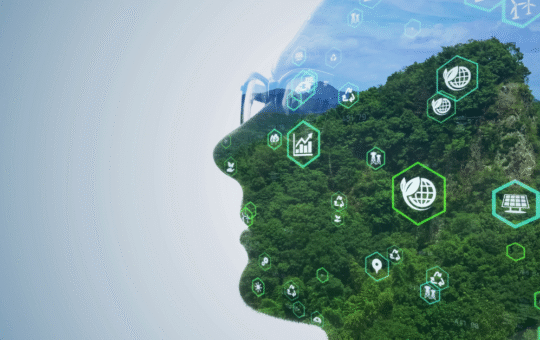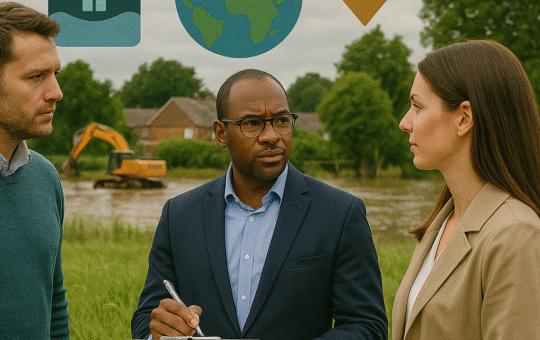Intermediate

Level 3 Diploma in Sustainability and Resource Efficiency
Level 3 Diploma in Sustainability and Resource EfficiencyCourse OverviewThe Level 3 Diploma in Sustainability and Resource Efficiency is designed to provide learners with the knowledge and skills required to support sustainability and resource efficiency within organizations. This diploma focuses on principles of sustainable development, resource management, and the practical implementation of strategies that reduce environmental impact while maximizing the use of resources. It is ideal for professionals who want to contribute to the transition to a more sustainable and resource-efficient economy across various industries.Benefits
Who is This Designed For?This diploma is ideal for:
- Gain practical knowledge in sustainable development and resource efficiency principles.
- Learn how to implement sustainability initiatives that reduce costs and environmental impact.
- Understand key sustainability concepts such as energy efficiency, waste management, and resource conservation.
- Develop skills to assess environmental impacts and implement sustainable practices in the workplace.
- Enhance your career prospects in environmental management, sustainability, and green industries.
- Contribute to the development of sustainable strategies that align with organizational goals and global sustainability targets.
- Understand the key concepts and principles of sustainability and resource efficiency.
- Identify opportunities to reduce resource consumption and waste across organizational processes.
- Develop strategies to improve energy efficiency and minimize environmental impacts.
- Implement waste reduction, recycling, and resource recovery programs.
- Evaluate the effectiveness of sustainability initiatives and recommend improvements.
- Communicate the importance of sustainability and resource efficiency to stakeholders and decision-makers.
- Introduction to Sustainability and Resource Efficiency
- Defining sustainability and resource efficiency in the context of business and industry.
- The role of sustainability in achieving long-term economic, environmental, and social benefits.
- The global and local context of sustainability: climate change, resource depletion, and sustainable development goals (SDGs).
- Principles of sustainable development: integration of social, economic, and environmental factors.
- The concept of the circular economy and its impact on resource management.
- How sustainability is aligned with corporate social responsibility (CSR) and business strategy.
- Sustainability and Resource Management
- The life cycle approach to resource management: raw materials, production, consumption, and disposal.
- Key resources: water, energy, raw materials, and biodiversity.
- Resource efficiency strategies to reduce consumption and waste.
- The role of sustainable procurement and supply chain management.
- The impact of efficient resource management on profitability and sustainability.
- How to assess and measure resource use across an organization.
- Energy Efficiency and Management
- Understanding the importance of energy efficiency in sustainability practices.
- Identifying energy-saving opportunities and technologies in buildings, transportation, and manufacturing.
- Implementing energy management systems (EnMS) and strategies for reducing energy consumption.
- The role of renewable energy and transitioning from fossil fuels to cleaner energy sources.
- Energy audits and the process of identifying inefficiencies and implementing solutions.
- The economic benefits of energy efficiency: cost savings, improved operational efficiency, and reduced carbon footprint.
- Waste Management and Reduction
- Understanding the environmental impact of waste and the need for effective waste management.
- Key principles of waste reduction, recycling, and reuse.
- How to assess an organization’s waste stream and identify opportunities for waste minimization.
- Developing and implementing a waste management strategy.
- Regulatory requirements for waste management and compliance with local, national, and international laws.
- Strategies for managing hazardous and non-hazardous waste in compliance with sustainability goals.
- Sustainable Supply Chains and Procurement
- The role of sustainable procurement in minimizing environmental impacts.
- How to assess suppliers and contractors for environmental sustainability.
- The importance of sustainability certifications (e.g., ISO 14001, Fair Trade, and FSC).
- Integrating sustainability into procurement processes: selecting eco-friendly products, materials, and services.
- Collaboration with suppliers to reduce the environmental footprint of products.
- Case studies on sustainable procurement practices and green supply chains.
- Water Conservation and Management
- The importance of water conservation in sustainability strategies.
- Identifying water usage in industrial, commercial, and residential settings.
- Strategies for reducing water consumption: recycling, rainwater harvesting, and water-efficient technologies.
- The role of water management in resource efficiency and sustainability.
- Water stewardship and corporate responsibility for managing water resources.
- Regulatory compliance related to water usage and discharge (e.g., wastewater treatment and pollution control).
- Environmental Impact Assessments and Audits
- Introduction to environmental impact assessments (EIA) and the need for evaluating potential impacts of projects or operations.
- Conducting an EIA: identifying impacts, stakeholders, and mitigation measures.
- The role of environmental audits in identifying resource inefficiencies and environmental risks.
- How to develop and implement an environmental audit plan.
- Best practices for conducting sustainability assessments and reporting environmental performance.
- How to use EIA and audit findings to improve sustainability and resource efficiency initiatives.
- Implementing Sustainability in Business Operations
- Developing a sustainability action plan for businesses: identifying priorities and setting goals.
- Integrating sustainability into business processes and operations.
- Employee engagement and fostering a culture of sustainability within the workplace.
- The role of leadership in driving sustainability initiatives across departments.
- Monitoring and measuring progress towards sustainability objectives.
- Reporting and communicating sustainability achievements to stakeholders and the public.
| Unit Title | GLH | TQT | Credit | Assessment Type |
| Introduction to Sustainability and Resource Efficiency | 15 | 30 | 3 | Assignment-Based |
| Sustainability and Resource Management | 15 | 30 | 3 | Assignment-Based |
| Energy Efficiency and Management | 15 | 30 | 3 | Assignment-Based |
| Waste Management and Reduction | 15 | 30 | 3 | Assignment-Based |
| Sustainable Supply Chains and Procurement | 15 | 30 | 3 | Assignment-Based |
| Water Conservation and Management | 15 | 30 | 3 | Assignment-Based |
| Environmental Impact Assessments and Audits | 15 | 30 | 3 | Assignment-Based |
| Implementing Sustainability in Business Operations | 15 | 30 | 3 | Assignment-Based |
- Sustainability managers, environmental officers, or resource efficiency professionals.
- Individuals working in industries where resource management and sustainability are key focus areas, such as manufacturing, construction, and logistics.
- Environmental consultants looking to expand their knowledge of sustainable practices and resource efficiency.
- Managers and executives responsible for implementing sustainability strategies within their organizations.
- Professionals interested in transitioning into sustainability-focused roles within their organizations.
- Take on roles such as Sustainability Manager, Resource Efficiency Consultant, Environmental Compliance Officer, or Green Procurement Specialist.
- Work in sectors like manufacturing, energy, construction, retail, and hospitality, where sustainability is a priority.
- Pursue further qualifications in environmental management or sustainability, such as ISO 14001 certification, LEED, or other green building certifications.
- Work as a sustainability consultant for organizations aiming to reduce their environmental impact and improve resource efficiency.
- Move into senior roles in environmental or corporate sustainability.
- Expert-Led Learning: Learn from professionals with hands-on experience in sustainability and resource management.
- Practical Knowledge: Gain real-world skills through case studies, practical assignments, and industry-specific examples.
- Globally Recognized Qualification: The diploma provides credentials respected by employers worldwide.
- Comprehensive Content: Covers a wide range of sustainability and resource efficiency topics to help learners drive meaningful change in their organizations.
- Career Development: The qualification helps open doors to sustainability-focused roles across multiple sectors.
Qualification Title: Level 3 Diploma in Sustainability and Resource Efficiency
Level: 3
Type: Diploma
Total Qualification Time (TQT): 240 hours
Guided Learning Hours (GLH): 120 hours
Credit Value: 24 credits
Assessment Method: Assignment-Based
Grading: Pass/Fail
Delivery Mode: Online / In-Person / Blended
Study Units Breakdown
| Unit Title | GLH | TQT | Credit | Assessment Type |
| Introduction to Sustainability and Resource Efficiency | 15 | 30 | 3 | Assignment-Based |
| Sustainability and Resource Management | 15 | 30 | 3 | Assignment-Based |
| Energy Efficiency and Management | 15 | 30 | 3 | Assignment-Based |
| Waste Management and Reduction | 15 | 30 | 3 | Assignment-Based |
| Sustainable Supply Chains and Procurement | 15 | 30 | 3 | Assignment-Based |
| Water Conservation and Management | 15 | 30 | 3 | Assignment-Based |
| Environmental Impact Assessments and Audits | 15 | 30 | 3 | Assignment-Based |
| Implementing Sustainability in Business Operations | 15 | 30 | 3 | Assignment-Based |
Upon completing this diploma, learners will be able to:
- Understand the key concepts and principles of sustainability and resource efficiency.
- Identify opportunities to reduce resource consumption and waste across organizational processes.
- Develop strategies to improve energy efficiency and minimize environmental impacts.
- Implement waste reduction, recycling, and resource recovery programs.
- Evaluate the effectiveness of sustainability initiatives and recommend improvements.
- Communicate the importance of sustainability and resource efficiency to stakeholders and decision-makers.
This diploma is ideal for:
- Sustainability managers, environmental officers, or resource efficiency professionals.
- Individuals working in industries where resource management and sustainability are key focus areas, such as manufacturing, construction, and logistics.
- Environmental consultants looking to expand their knowledge of sustainable practices and resource efficiency.
- Managers and executives responsible for implementing sustainability strategies within their organizations.
- Professionals interested in transitioning into sustainability-focused roles within their organizations.
Assessment Type: Assignments Based
Top Courses
Related Courses
Let's Get in touch
Deleting Course Review
Are you sure? You can't restore this back
Course Access
This course is password protected. To access it please enter your password below:



